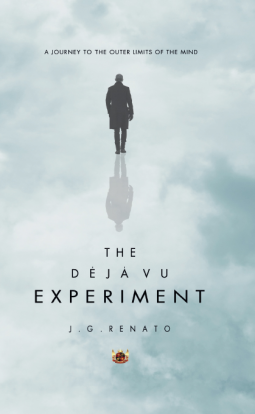
The Deja Vu Experiment
by J.G. Renato
This title was previously available on NetGalley and is now archived.
Send NetGalley books directly to your Kindle or Kindle app
1
To read on a Kindle or Kindle app, please add kindle@netgalley.com as an approved email address to receive files in your Amazon account. Click here for step-by-step instructions.
2
Also find your Kindle email address within your Amazon account, and enter it here.
Pub Date Jan 31 2014 | Archive Date Apr 05 2014
Veritas Shield | Independent Book Publishers Association (IBPA) Members' Titles
Description
And the experience of ourselves as the dreamers. If we choose not to ignore them, but to follow them, like Alice down a cosmic rabbit hole, we might just begin to understand how it was that we got here in the first place.
This book is about not ignoring them, but embracing them. Journey to the outer limits of the mind to explore the worlds of quantum physics, black holes, and superstring theory.
John Galt guides us through The Déjà Vu Experiment. He acknowledges that he was wrong about stopping the motor of the world, not just because stopping that motor may have been harmful to too many people, but because that was the wrong motor. Instead of asking the immortal question “Who is John Galt?” the proper question to ask is: “What is John Galt?”
The singular perspective of John Galtʼs transformed character is certain to attract the discerning enthusiasm of Ayn Rand fans everywhere. Readers worldwide will gain valuable insights that transcend our boundaries of previous notions about reality, life, and our purpose.
Author Biography: J. G. Renato is a Harvard educated author and an inventor who lives in northern Virginia.
A Note From the Publisher
Cover design: Crimson River, Cover photography: Arcangel Images. Also available in hardback (978-0-9897186-0-8) and e-book formats.
Advance Praise
ForeWord Reviews
Clarion Review
GENERAL
The Deja Vu Experiment
J. G. Renato
Veritas Sheild
978-0-9897186-1-5
Five Stars (out of Five)
Renato manages to be metaphysical while also remaining lighthearted and fun for a book that explores the nature of existence.
In The Déjà Vu Experiment, a brief and beautifully presented metaphysical minimemoir, J. G. Renato attempts to uncover the deeper meaning behind that often disconcerting déjà vu we’ve all experienced at some time or other. He skillfully uses this sense of stepping out of one plane of reality and seeing things from a different perspective to explore the whole nature of being, presence, and existence. Most crucially, he poses the thorny question of how spiritual phenomena can fit within a world obsessed by rationality and tangible productivity.
The author chronicles many abstract metaphysical concepts—an area that runs the risk of losing all but the most devoted fans of esoterica. Yet, by anchoring abstract metaphysical concepts solidly in the turning points of his life—including his decision to turn his back on a successful career as an engineer and designer—Renato keeps us turning the pages with avid interest.
The prompts on his road to self-discovery are a strong childhood recollection of slipping out of time when staring at the lettering on a grain elevator, and his love for a widowed waitress who teaches him to overcome his self-imposed stumbling blocks of proof, evidence, and demonstrable fact. In a few concise, heartfelt paragraphs, his sweetheart Diana comes winningly to life and Renato conveys a rounded and complex sense of her charm. He also skillfully distinguishes Diana the love object from the spiritual teacher—a woman who has had a hard life, not least of which includes the brutal loss of her husband at an early age.
The narrative blends diverse topics ranging from the French deconstructionists to his father’s midwestern auto-repair shop, a feat of accomplished storytelling that could seem clumsy and contrived in less able hands. Throughout, Renato warns readers of the dangers of trying to reduce human experience to facts and figures. By doing so, we may miss the vital realization that the truth is to be found in the lacunae—or unexplored gaps that lie at the outermost edges of our knowledge. With his academic physics training and spare writing style, Renato gracefully communicates the essentials of quantum physics to the uninitiated without getting bogged down in arcane academic references. He acknowledges that language is a problem in describing fleeting philosophical concepts, but what will strike the reader is not just the clarity of Renato’s thoughts. It’s the ease and grace with which he expresses them.
This poetic, thoughtful read will appeal to those interested in the mystical. The key achievement of this slight volume is managing to be metaphysical while remaining lighthearted and fun. Particularly appealing are the inclusion of “perception exercises” that contrast our concept of our body parts with that of the architecture around us. Like Alice’s Adventures in Wonderland—which he references frequently—there is deceptively more to this charming tale than might at first meet the eye.
The Déjà Vu Experiment pays tribute both to the accomplished and intelligent engineer Renato was—modesty might prevent him from describing himself as such—and to the sage he has become. Reading this charming tale explains how a subtle shift in perspective is perhaps all it takes for us to recognize the most important elements at the heart of our being. —Seamus Mullarkey
Reviewed by Patricia Reding for Readers' Favorite
What might John Galt have thought if he had left his followers in the valley of Colorado? Would he have continued to follow the idea that only the material mattered? Or, might he have undergone a philosophical revelation? In The Déjà Vu Experiment, J.G. Renato expounds upon this idea. The Déjà Vu Experiment is not a “story.” It is, rather, a discussion of the little anomalies in life that may lead one to look at the world in a new way. These anomalies, these “gaps” were discovered and then examined by John Galt when he met Diana, an Iowa farm girl who encouraged his curiosity.
Renato suggests that people are so intent on their own internal realities that they fail to notice the greater world. He challenges them to “look through the veil” of their historical understanding. It is the strange little events that will wake people from their typical hypnotic approach to life, events often brought forth through art, theology, and science. Living our “mortal dreams,” we miss out on an appreciation of the eternity in which we live, an eternity without past, present, or future.
I especially appreciated the quotes Renato shared from Marianne Williamson, Albert Einstein, Jack Kerouac, the Chinese philosopher, Zhuangzi, Tolstoy, and more. Some of his ideas encouraged my thoughtful consideration and challenged my understanding. For example, Renato suggests that if we operated just as spirit, if we knew of our immortality, “it would be tough to get a rousing game of life going.” He also asks, which is really in charge: you or your body? Offering unique ways to look at light, quantum physics, string theory, the universe existing as a single unified melody, the power of imagination, free will, the language of mathematics, death, and more, Renato successfully challenged me to consider not just “Who am I?” but “What am I?”
Available Editions
| EDITION | Paperback |
| ISBN | 9780989718608 |
| PRICE | $11.95 (USD) |






